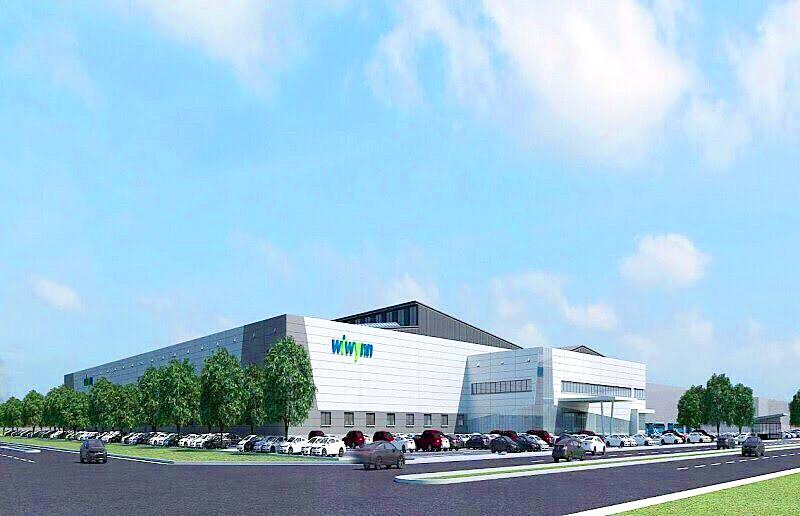Cloud computing equipment company Wiwynn Corp (緯穎科技), which counts Meta Platforms Inc as one of its key customers, is boosting capacity expansion in Malaysia through a new investment of about NT$1.94 billion (US$64.7 million), it said yesterday in a statement filed with the Taiwan Stock Exchange.
The investment, which aims to help the company with business development and strategic arrangements, would be made through subsidiary Wiwynn Technology Services Malaysia Sdn Bhd to build a new factory, Wiwynn said in the filing.
The announcement came about one-and-a-half months after the company started phase II of its new server printed circuit board assembly (PCBA) plant for cloud data centers at the Senai Airport City industrial development in Malaysia’s Johor state.

Photo courtesy of Wiwynn Corp
With the new server PCBA plant, Malaysia would become one of Wiwynn’s manufacturing hubs, providing complete services from PCBA to rack integration to address surging demand from hyperscale data centers, it said.
Wiwynn said it plans to complete phase I construction of the facilities — a server rack integration plant — in the first quarter of next year, followed by the PCBA plant in 2024.
Wiwynn is a subsidiary of notebook computer maker Wistron Corp (緯創), which owns about a 44 percent stake in the server manufacturer.
Wiwynn, based in New Taipei City’s Sijhih District (汐止), posted a record-high net profit of NT$3.56 billion last quarter, a 54.3 percent increase from NT$2.31 billion in the second quarter last year, the company said in a statement released earlier this month.
Earnings per share rose to NT$20.38 last quarter, up from NT$13.2 a year ago.
Revenue soared 46.62 percent to a record high NT$75.06 billion during the quarter ending on June 30, compared with NT$51.29 billion in the same period last year.
Wiwynn expected the growth momentum for cloud-based data centers to extend into the second half of the year, as companies accelerate digital transformation and adopt artificial intelligence applications, the statement said.
The company said it would continue investing in expanding capacity in Taiwan, North America and Southeastern Asia in response to market uncertainty and supply chain risks.
The company is also seeking closer collaboration with customers and supply chain suppliers to maintain resilient operations, it added.

Sweeping policy changes under US Secretary of Health and Human Services Robert F. Kennedy Jr are having a chilling effect on vaccine makers as anti-vaccine rhetoric has turned into concrete changes in inoculation schedules and recommendations, investors and executives said. The administration of US President Donald Trump has in the past year upended vaccine recommendations, with the country last month ending its longstanding guidance that all children receive inoculations against flu, hepatitis A and other diseases. The unprecedented changes have led to diminished vaccine usage, hurt the investment case for some biotechs, and created a drag that would likely dent revenues and

Macronix International Co (旺宏), the world’s biggest NOR flash memory supplier, yesterday said it would spend NT$22 billion (US$699.1 million) on capacity expansion this year to increase its production of mid-to-low-density memory chips as the world’s major memorychip suppliers are phasing out the market. The company said its planned capital expenditures are about 11 times higher than the NT$1.8 billion it spent on new facilities and equipment last year. A majority of this year’s outlay would be allocated to step up capacity of multi-level cell (MLC) NAND flash memory chips, which are used in embedded multimedia cards (eMMC), a managed

CULPRITS: Factors that affected the slip included falling global crude oil prices, wait-and-see consumer attitudes due to US tariffs and a different Lunar New Year holiday schedule Taiwan’s retail sales ended a nine-year growth streak last year, slipping 0.2 percent from a year earlier as uncertainty over US tariff policies affected demand for durable goods, data released on Friday by the Ministry of Economic Affairs showed. Last year’s retail sales totaled NT$4.84 trillion (US$153.27 billion), down about NT$9.5 billion, or 0.2 percent, from 2024. Despite the decline, the figure was still the second-highest annual sales total on record. Ministry statistics department deputy head Chen Yu-fang (陳玉芳) said sales of cars, motorcycles and related products, which accounted for 17.4 percent of total retail rales last year, fell NT$68.1 billion, or

In the wake of strong global demand for AI applications, Taiwan’s export-oriented economy accelerated with the composite index of economic indicators flashing the first “red” light in December for one year, indicating the economy is in booming mode, the National Development Council (NDC) said yesterday. Moreover, the index of leading indicators, which gauges the potential state of the economy over the next six months, also moved higher in December amid growing optimism over the outlook, the NDC said. In December, the index of economic indicators rose one point from a month earlier to 38, at the lower end of the “red” light.